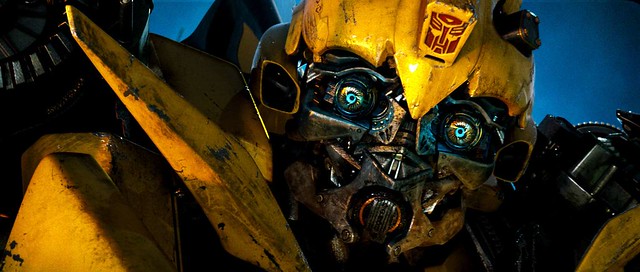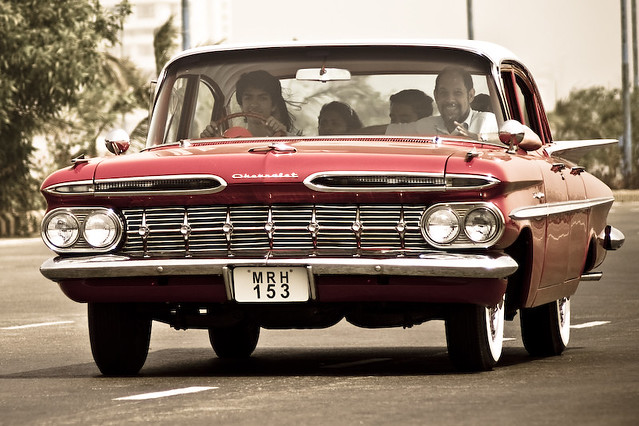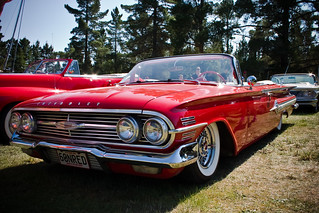Dear Suits at Chevrolet India and Generally Motors, How are you guys doing? I know that times are hard and you guys must be struggling hard to fill Gas in your Corvettes and Camaros. That is alright, we all go through these phases. Niceties done, let me get to the point:
What the facebook are you people doing in India?
Yes, yes I know that you guys are selling cars. My question here pertains more to why your ways of car-selling are so screwed up in India. Your sales figures are pathetic and your cars are as visible on Indian roads as is sensible driving. You are losing some Rs.670000 on every car you sell, you are plagued with frequent recalls of even new models, management reorganization, you lack any sort of long term strategy, you keep on cutting prices, you are unsure of what you stand for in India and what you should offer, you either overprice or underprice your cars, you have zero customer confidence and so on. Well, yes, you are not anywhere near the bottom of the heap, but none of your competitors who are doing equally bad numbers have eight models in their lineup as you do! In Septemeber 2013 you sold 7000 cars from 8 models, and not even one of these models have made it to the top 20! It speaks volumes when a contraption like the Maruti Eeco sells more numbers than a just-released Chevy Enjoy. What is plaguing the brand that is synonymous worldwide with everything automotive? It has all been your making only, sadly.
Chevrolet, in India, today.
Forgive me if I sound like the quintessential MBA, but “Chevrolet has not only squandered its advantage as a first mover but also has failed at exploiting the high levels of brand recall it has in a market which exhibits high degrees of nostalgic brand association, while also it has completely destroyed its perceived superiority as one of the icons of the World’s most developed country.” This means that Chevrolet comes only second to Fiat in spectacularly screwing up its ridiculously easy chances of making it to the top in one of the World’s fastest growing automobile markets. When you could have made use of all that goodwill you had among Indians, you decided to go the other way and tried to sell us what you thought would be best for us according to you, instead of selling us what we wanted. See, you totally read India and its demanding market wrong, which I assume you managed to do by totally doing away with something called as “Market Research”.
India has a long tryst with the Chevy. Chevrolet were making cars here since 1928 and even after leaving India in 1953, Chevys were idolized and fancied for decades to come. When you came back with the Chevy you decided to woo Indians with old Daewoos and unknown Chinese cars rebadged as Chevys which leaves us where we are today. The little Spark is actually the Daewoo Matiz. The Beat, is the Spark for the rest of the world and an authentic Chevy. The Sail U-VA and Sail Sedan are both thoroughbred Chinese and made-for-China cars by your Chinese subsidiary. The Cruze which kicked up a storm when it was launched is as American as Chevy gets in India. The horribly outdated angular bread-box called the Tavera is actually the ancient Isuzu Panther. Your latest disaster the “Enjoy” is only the same balls-to-bones Chinese Wuling Hongguang transplanted to India. The Captiva, unlike it is thought to be, is not American but Korean as well, though a brilliant vehicle with nonexistent sales. Your previous models were no different with the bland Aveo (Daewoo Kaleos) and the nice Optra (Daewoo Lacetti). You tried to pitch the Optra as all-American, but it did not work out. Let us not even talk about the (Subaru) Forrester. It hurts.

The Great American Chevrolet Dream
Though much has been said about Chevrolet and its failure in India, I would like to think that trying to sell us Korean and Chinese cars masquerading as Chevys is where you got it wrong on the ground. See, we Indians might be inherently socialist but we secretly admire America, though most would never admit it. A Green Card is more lusted after than Katrina Kaif and most of our “IT crowd” would kill for that “onsite” opportunity because most of the Great Indian Dream is about living the Great American Dream. We gape at how everything is so big, bold and brash about America and how they show the middle finger and invade the shit out of any country they want to. And Chevrolet has always stood for everything invincibly American, one of those all-American cultural icons right up there with the Stars n’ Stripes, the Bald Eagle, Blue Jeans, Coca-Cola, Elvis and Pamela Anderson.
And as such, when we were dreaming of “true-blue” big and brash, in-your-face, kickass real-steel American Chevys rolling into India kicking up dust and crushing diminutive little hatchbacks under their massive wheels, you give us the same Korean and Chinese plastic slapped with the Golden Bowtie to buy instead! What the hell? We already have plenty of the former cluttering up our roads, and the less said about the latter, the better. See, we really don’t like China. They humiliated us in ’62, they try to grab our land, they seem to be beating us to the race to the “next superpower” and they have got bullet trains and all while we are stuck with the World’s biggest toilet. Chinese stuff is considered only next to junk in India, seen as inferior, low quality and plasticky Japanese knockoffs, sold in bulk at “take all for Rs.99” makeshift roadside thrift stores or shady back-alley hole-in-the-wall shops, guaranteed not to last in one piece for more than a couple of months. And this is what you are trying to sell us?
Whatever happened to “Like a Rock” Chevrolet? We drool and dream of the mighty Suburban, the indestructible Tahoe, and the apocalyptic Silverado. After all, Hollywood has taught us that the FBI manages to keep America safe only thanks to its Suburbans. Petrolheads among us orgasm at the mere sight of the Nova, the Chevelle, the Camaro, the Monte Carlo, all the SS’s and of course, that immortal symbol of everything American, the Corvette! India has never had muscle cars or any decent machines for that matter, hence smoking tires on screen = adrenaline for us! So we get all confused when GM tries to sell us plastic cars which refuse to move even if we stand on the accelerator. Well, nobody is asking to import and sell us the same stuff sold in America. Every market is different, and there is no market as different as the Indian market. Whoever adapts to this market survives. Whoever does not, perishes like a dewdrop on a leaf in the Thar desert.
The Great Chevrolet Question and Some Answers
What does Chevrolet stand for in India? You will have to stand for something to make a difference, rather than being just another brick in the wall. In India, all manufacturers have positioned themselves to stand for something. Toyota stands for reliability, Maruti for their mileage and easy to run cars, Tata for VFM and Cabs, Hyundai for easy to run, quality cars, Volkswagen for “German Engineering”, Ford for fun to drive, made-for-India American cars, Skoda for build and quality, Honda for Japanese efficiency and so on. And Chevrolet? Chevys in India are not the best lookers, don’t have the best mileage, don’t have the best service, aren’t the cheapest to run, aren’t the strongest built or have best VFM, aren’t the best to drive or are the best quality cars. You guys are just average in everything. So why should I buy a Chevy? To pay tribute to your brand engineering skills? You should position yourself according to your strengths, as how you are seen by
Let us look at your fellow compatriot from Detroit, Ford (India). There was no difference in market-share between you two for the most part with you guys even outselling Ford for a couple of months last year! But the Ecosport has changed all equations and Ford has left you in the dust. So why could Ford do it while you guys couldn’t? It is called positioning and perception, boys. Marketing. Ford has us all convinced that the Ecosport is “made for India” and what we need to traverse our pathetic cities. It does not matter that their ad plays an American country song. This is where you need to learn. You should stand for something.

Looking at your various country websites, I can see that your sales strategy seems to be awfully geography centered. India seems to be bundled in with the Eastern part of Asia. Bad move. You guys should understand that just because of the geographic proximity, India is not like China or Singapore or Pakistan. We are a continent in ourselves! If you go around thinking “Hey, India is near China, so whatever sells in China will totally sell in India too! Let us slap a Chevy badge on a Wuling Hongguang and ship it there!” (Seriously, were you expecting that thing to sell?) you will fall flat on your face. You cannot expect the same cars you sell in China to sell in India. We would rather have the cars you sell in the Middle East. Well, the results are there for everyone to see, no? Which is where I think you need to have a long, hard look at what you are selling in India which do not sell and what you could sell in India which could get you even a profit.
Chevrolet’s Wasted Opportunities in India
Chevy’s dismal performance in India can be attributed a lot to the models you sell in India, most of which are unmitigated disasters. The Spark (Matiz) has been around for some 20 years now. The Sail twins are decent enough but have the “Chinese” tag and hence will never be able to match up to the Amaze, Dzire or even the Etios. Despite all the initial hype, the Cruze is almost dead now, outsold in droves by the Skoda Laura/Octavia. You should think why the Cruze, the only “Real” American Chevy in India, is the only car in your stable that had sparked any kind of public interest here. But your biggest joke so far has been the terribly named “Enjoy” which has sold only 5000 units since its launch 3 months ago. The Enjoy was supposed to take on the mighty Toyota Innova but all it has managed to do is to look like a malnourished Innova. And the Tavera, as old as the dinosaurs, looks like it was assembled by a hurricane in a junkyard.
On top of all this, there are heaps of bad press about GM in India. Layoffs, recalls, price cuts, you look desperate. You either overprice your cars or underprice them. You price cars dirt cheap thinking the “price conscious” Indian market will lap them up. We don’t. See, though we like cheap stuff, we don’t want anyone to know that it is cheap. So, though we would like cars with cut prices, we don’t want to buy them because we want expensive cars. Well, we are complicated. There is no such thing as straightforward from A to B in India. It is always from A to B via all the remaining 24 alphabets.

It is baffling why GM and Chevrolet are trying to sell us all these plasticky, outdated and bland cars when you have so many great and capable products in your lineup, which with a little clever tweaking could work wonders in India. The Traverse, for example, could turn out to be an Innova killer if you replaced that 3.6 V8 with a 2-liter diesel, stripped it of all its bells and whistles and pitched it as an efficient people carrier. But your real opportunity does not lie there. Do you realize how stupendously crazy Indians are about SUVs, the bigger and brawnier the better? And there is no one to beat Chevrolet when it comes to brawny SUVs. If Toyota could laugh all the way to the bank with a bland Fortuner, products like the Equinox, the Trailblazer, the Tahoe and by a stretch, the Suburban would break the bank for you! And now, when the entire country is going apeshit about mini SUVs, it is almost criminal that you are not even thinking of launching the Trax! What is wrong with you? You have a veritable goldmine sitting there, looking at how the Ecosport raked up 30,000 bookings in just three weeks! Moving up, Lamborghini is already opening its third dealership in India, in Bangalore. So what is stopping you from bringing us the Camaro and the Corvette? We all love Bumblebee, you know. And where the hell is the Impala?
The Legacy of the Impala
“Caron mein ek car chuni hai, Car chuni hai Impala, Impala mein tujhe bithakar, Le jaayega dilwala…” The Impala has been for long a pop culture icon in India, and for long was the most desired car in the country. There has been no single car model in India that has had as much brand recall value for “premiumness” as the Impala had! In our old socialist days the phrase “Benz, Impala and Toyota” were used to signify the pinnacle of being wealthy and having the latest tools at your disposal. We were in love with that looong hood and boot, that low stance, twin headlights, tail fins and the open top. The Impala was the Jaguar of our grandfathers, the de-facto luxury car of the socialist noon. In fact, most Indians do not even know that the Impala belongs to Chevrolet and that it is actually still being produced today! So dear Chevrolet, Y U NO launch Impala in India? I know you Americans do not think very highly of the car, but with a bit of clever marketing and positioning as a premium luxury car in India, it would give the indomitable Skoda Superb a run for its money!
The Chevrolet Impala then (1960) and now (2014)
Please, Please Do Something!
You know why I am writing all this? I am sad, brother. I weep looking at the floundering fortunes of such a legendary brand. I cringe, seeing the broad-chested, star spangled banner waving, brash, loud and strong, all-American icon of superpower-ness meekly trying to woo people to buy their scrawny (ugh) Chinese cars! What a fall from grace! All that, when you could have filled the (potholed) roads of India with the Golden Bowtie. And like any good MBA I am going to put my application-driven skills of making bullet points to present what going forward you guys need to get your eyeballs on how to interactively and proactively recapitalize your business process initiatives to dynamically conceptualize highly efficient process services to overcome your strategic and procedural imbalances. Efficient paradigm shifts thereby unleashed will result in a drastic transformation in customer and market perceptions which will result in sustainable business action and ROI maximization. In other words, here is what you need to do to get your shit together in India:
- India is a market unlike any in the World. Learn to read it. Or ask for help.
- Give us what we would want and not what you think we want. If not, convince us.
- Have some kind of long-term strategy for India. Stand up and stand for something. What do you want to be seen as?
- Try to make use of the goodwill, brand recall and other stuff that would work in your favor in India.
- Lose the Chinese and Korean Kei-Cars (Okay, that is Japanese, but well, you get it).
- Launch at least two models from your American stable, suitably “Indianized”.
- This is apart from the Trax, which you must launch now before it is too late.
- Regain confidence of your customers. Stop price cuts and firings, don’t create chances for recalls.
- Re-jig your dealer and distribution network. And service network.
- Get a good advertising agency. And a consultant. And read Team-BHP.
At the end of the day, the Sun goes down. Waiting to see the Golden Bowtie back in India in all its glory! All the busstand!
P.S: Apparently, my wishes did not work out. As of today, May 18, 2017, GM has announced its withdrawal from India for the second time, along with South Africa, planning to stop sales of all Chevrolet brand cars by the end of the year. They will still produce cars for import. For what, though? If you can’t sell cars in the fastest growing (and possibly the only remaining) car market in the world, where people will buy anything with four wheels and shiny paint, where else can they hope to sell? These guys can’t sell water in a desert. Funnily enough, only two years back, GM had announced a one billion USD investment in India when GM CEO Mary Barra called on PM Narendra Modi.








Well the fact is that even Americans don’t prefer the Chevys. Except for a few reliable trucks and may be a few SUV’s. You cannot go by the looks of an American automobile plainly because their Japanese competitors are better off at fit and finish and of course reliability. IT looks like GM is a company that is sort of stuck in time while its long time competitors have moved on.
you should have got an offer from GM by now !!!
Very well written Mr. Vadakkus!
simply amazing. i could feel every word. iam a die hard fan of chevy. love there history. there engines are so damm famous. whats wrong with them when it come to India. one thing that is still missing in Indian market are muscle cars, common Indians don't actually cry for mileage. if its got some serious power under the hood and gives us a hollywood feeling while driving it, tank full everyday. who doesnt like roaring engines and that too when your the holy grail when it comes to powerfull engines. IMPALA we really need it back